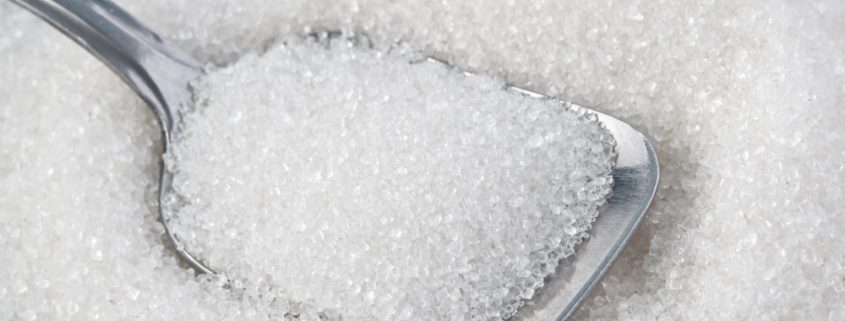Just a Spoonful of Sugar
Sugar itself is not bad. What is hazardous to our health is the quantity. The recommended amount of sugar is 6 teaspoons a day for women and 9 teaspoons for men. But Americans are consuming an average of 30 teaspoons per day, adding up to 3 pounds of sugar per week and 130 pounds of sugar per year. The incidence of obesity, diabetes and many cancers in the US has escalated parallel to the rise in sugar intake. So let’s dial it back to 6 to 9 teaspoons per day.
By reducing the amount of sugar we consume, we could reduce the risk of chronic disease (such as heart, cancer, and diabetes). Excessive sugar can literally kill us. It damages our heart and may be linked to cancer. It has a similar toxic liver effect to alcohol and it saps brainpower.
Cutting back on sugar also gives us the ability to taste the flavors of food and being to lose the sweetness craving.
Sugar risk is complicated by corn syrup, known by various names (high fructose corn syrup, dextrin, fructose, glucose and more).
[su_expanding_quote_without_link alignment=”left” source=”Michael Pollan, In Defense of Food” full_quote=”Thirty years ago the number of ingredients used to sweeten foods and beverages could be counted on one hand. Today, there are 25 ingredients used to replace sugar…lurking in unexpected places including salad dressings, spaghetti sauces, breads and cereals. And since added sugar is now listed under many different names, it’s often tricky to find it on the ingredient label.” short_quote=”Today, there are 25 ingredients used to replace sugar…lurking in unexpected places including salad dressings, spaghetti sauces, breads and cereals.”When corn is processed into cornmeal, or corn flour, the leftovers are turned into corn syrup. Because it is cheap, it is added to just about all processed foods.
[su_expanding_quote_without_link alignment=”right” source=”Marion Nestle, What to Eat” full_quote=”The more corn sweeteners in a product, the cheaper the product is to make. If corn sweeteners have any special role in weight gain, it is most likely because they are added to so many food products.” short_quote=”The more corn sweeteners in a product, the cheaper the product is to make.”]The Standard American Diet is primarily composed of processed foods.
[su_expanding_quote_without_link alignment=”full” source=”Joel Fuhrman MD, Eat to Live” full_quote=”Since more than 40% of the calories in the American diet are derived from sugar or refined grains, both of which are nutrient-depleted, Americans are severely malnourished. Refined sugars cause us to be malnourished in direct proportion to how much we consume them. They are partially to blame for the high cancer and heart attack rates we see in America. Its not merely dental cavities shat should concern us about sugar. If we allow ourselves and our children to utilize sugar, white flour products and oil to supply the majority of our calories, as most American families do, we shall be condemning them to a lifetime of sickness, medical problems and a premature death” short_quote=”Since more than 40% of the calories in the American diet are derived from sugar or refined grains, both of which are nutrient-depleted, Americans are severely malnourished.”]What to Do?
Avoid corn syrup. The best way is to eat less processed foods. Try the 10-Day Pledge from 100 Days of Real Food. If the Pledge seems impossible, three places to reduce sugar are breakfast, drinking habit and salad dressing (because we want to eat a salad a day for health)
Replace packaged breakfast cereals or prepackaged oatmeal with homemade. By planning ahead overnight oats or crock-pot oatmeal can become part of your routine. A couple of hours on the weekend can produce delicious, nutrient rich muffins and breakfast breads easy to pull out of the freezer on busy weekday mornings.
[su_expanding_quote_without_link alignment=”full” source=”Marion Nestle, What to Eat” full_quote=”Breakfast cereals are supposed to be good for you, and the relatively unprocessed ones (short ingredient list, fiber and little or no added sugar) still are, but most are now so thoroughly processed and sugared and filled with additives that they might as well be cookies. You can hardly find a cereal without added vitamins, so let’s call them vitamin-enriched low fat cookies.” short_quote=”Breakfast cereals are supposed to be good for you, but most are now so thoroughly processed and sugared and filled with additives that they might as well be cookies.”]Replace store-bought salad dressing with your own; it takes 5 minutes to make
Change our drinking habits.
[su_expanding_quote_without_link alignment=”right” source=”Joel Fuhrman MD, Eat to Live” full_quote=”The bottled and boxed fruit juices that many children drink are a poor food; with no significant nutrient density, they lead to obesity and disease. Processed apple juice, which is not far from sugar water in its nutrient score, accounts for almost 50% of all fruit servings consumed by preschoolers. Juice is not a fruit, and prepackaged juices do not contain even one-tenth of the nutrients present in fresh fruit. They should be used moderately as they contain a high concentration of sugar and no fiber. They do not contain protective nutrients and phytochemicals, so stick with the real thing. ” short_quote=”The bottled and boxed fruit juices that many children drink are a poor food; with no significant nutrient density, they lead to obesity and disease.”]Instead of sodas, let’s keep a pitcher of “nature-flavored” water – slices of lime, fresh mint, sliced cucumbers etc – on hand. Iced herbal teas are another a refreshing option. We don’t need to give up juice forever, just reduce the amount – it could be a glass after a full meal. Or a Saturday dinner treat. Find a way to reward your kids, and yourself for changing drinking habits.
Reduce the amount of sugar added to coffee/tea, baking. The quantity of sugar in recipes these days is alarming. I always reduce the amount in recipes by at least one-fourt
Avoid artificial sweeteners; there are serious reasons to question their safety
Get moving. If getting to the gym regularly doesn’t fit in your schedule, parking far from the entrance to work, to the grocery store etc and let’s try to talk 10,000 steps a day.
[su_expanding_quote_without_link alignment=”full” source=”atrick Quillan, Beating Cancer with Nutrition” full_quote=” Our bodies are not built to withstand the constant flood of simple sugars entering our bloodstream. If we were active and burning up the sugar in exercise, then the sugar would be of less consequence. But we sip and munch on sweet food all day long while sitting at our desks or in front of the TV, and then wonder why morbid obesity has increased by 300% since 1982. ” short_quote=”ur bodies are not built to withstand the constant flood of simple sugars entering our bloodstream.”]For more health empowerment, check out:
What Does Sugar Do To Our Health?
Research from the World Health Organization has found that sugar, particularly in sugar-sweetened beverages can lead to an unhealthy diet, weight gain and an increased risk of non-communicable diseases such as diabetes and heart disease.
Sugar consumption has also been linked to diabetes and heart disease in children. Sugar has also been linked to cancer.
5 Reasons High Fructose Corn Syrup Will Kill You
Sugary drinks linked to hundreds of thousands of deaths worldwide
Consumption of added sugars or sugar-sweetened beverages has been linked to diabetes, cardiovascular disease, and cancers
Should Sugar Be Regulated Like a Drug?




Leave a Reply
Want to join the discussion?Feel free to contribute!